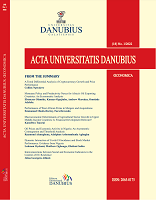Exchange Rates Fluctuations, Economic Factors and Financial Performance Evaluation of Multinational Companies in Nigeria
Exchange Rates Fluctuations, Economic Factors and Financial Performance Evaluation of Multinational Companies in Nigeria
Author(s): Augustine E. Osho, Olufemi Ayobami FagbamilaSubject(s): Business Economy / Management, Micro-Economics, Energy and Environmental Studies, Financial Markets
Published by: Editura Universitară Danubius
Keywords: Exchange Rate; Interest Rate; Return on Asset; Oil; Gas Multinational Companies;
Summary/Abstract: This study examined the effect of exchange rate fluctuation economic factors on financial performance of multinational companies in Nigeria, It specifically examined the effect of nominal exchange rate, real exchange rate, interest rate as well as exchange rate fluctuations on the financial performance of listed multinational oil and gas firms in Nigeria performance of deposit money banks in Nigeria. Secondary sources of data was employed to extract useful information from the Audited Annual Reports of the eight (8) oil and gas firms sampled were selected through purposive sampling technique for the investigation for the periods 2006-2020. The measures of exchange rate fluctuation economic factors comprise of foreign exchange rate fluctuation (FXRF), real exchange rate (REER), nominal exchange rate (NOER interest rate spread (INSR), firm’s size (FSIZE), financial leverage (FLV) and business risk (BSR) with financial performance, being dependent variable measured by return on asset (ROA). Both descriptive and inferential statistics. Correlation and regression analysis were used to test the hypothesis. Findings revealed that nominal exchange rate and interest spread rate have positive and statistically significant relationships with return on asset (β=1.395,pvalue 0,000 and 0.017;p- value 0.000) at the level of 5% level of significant while foreign exchange rate fluctuation, real exchange rate ,firm size and financial leverage has a negative and statistically significant association with return on asset (β=-0.0021,p-value=0.000,-8.01;p-value 0.049,-0.00031;p-value 0.038, and -0.00867;p-value|=0.002) respectively at 5% level of significant. The study concluded that exchange rate fluctuation economic factors have strong statistical relationship with the financial performance of listed oil and gas companies in Nigeria. Based on the findings, the researchers recommends that micro-economic factors such as financial leverage, company size, and business risk should be taken into consideration by the management of Nigerian listed oil and gas businesses when mediating on fluctuations in the country’s foreign currency rate. To lessen the severity of exchange rate fluctuations, the appropriate authorities should take proper steps to protect the value of the native currency. Furthermore, oil and gas companies should constantly assess the impact of fluctuations in the nominal exchange rate on their income from upstream and downstream oil exploration activities, and implement strategies to mitigate the negative impact of these fluctuations.
Journal: Acta Universitatis Danubius. Œconomica
- Issue Year: 18/2022
- Issue No: 5
- Page Range: 160-181
- Page Count: 22
- Language: English

